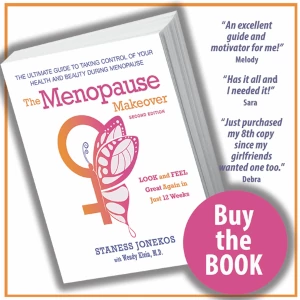 I have it, my Mom has it, most of my girlfriends have it, their daughters may get it, and our partners will be affected by it.
I have it, my Mom has it, most of my girlfriends have it, their daughters may get it, and our partners will be affected by it.
Vaginal atrophy will affect many women as they age. According to the North American Menopause Society, up to 75 percent of menopausal women may experience vaginal dryness, a symptom of vaginal atrophy.
Last September the Partners’ Survey, conducted by StrategyOne and sponsored by Novo Nordisk, was announced at the North American Menopause Society (NAMS) conference. The results showed that women are not the only ones affected. Sixty-five percent of men worried that sex would be painful for his partner, and almost a third of both men and women reported that they have discontinued having sex with their partners altogether as a result of discomfort.
Vaginal atrophy affects a woman’s health, intimate relationships and quality of life. Another international survey revealed that many women do not discuss the topic with their healthcare professionals because they feel vaginal atrophy is a natural part of growing older and nothing can be done about it.
Estrogen, important for maintaining vaginal health and lubrication, is the hormone that actually plumps up the cells in the vagina. When estrogen levels decline, the vaginal walls can become thinner, less elastic and dryer.
The result is vaginal atrophy, which is a chronic condition. Symptoms include vaginal dryness, burning and itching, irritation or soreness, pain and bleeding during intercourse, or urination.
Margery L.S. Gass, MD, NCMP, NAMS Executive Director says,
With severe vaginal atrophy, the tissues of the vagina become dry and sometimes fragile and inflamed. As a result, they are more prone to injury, tearing, and bleeding during sexual intercourse or even a pelvic exam. Over time, especially in the absence of regular intercourse, the vagina may also become shorter and narrower. The resulting discomfort can intensify to the point where sexual intercourse is no longer pleasurable or even possible.
Not only does the physical act of intercourse become a challenge but the increased emotional stress can be a double whammy for a healthy sexual relationship.
The Partners’ Survey, that included 4,167 post-menopausal women aged 55 to 65, found that 57% of women reported that they avoid being intimate with their partner, and 65% said they lost their libido.
The good news is the majority of the 4,174 men in the survey were concerned about what was going on with their partner. Unfortunately, this taboo subject has partners turning off the lights at night rolling over confused and frustrated.
This topic is so sensitive that, according to the International Menopause Society, 70% of women say their healthcare professionals have only rarely or never raised the subject with them.
James A. Simon, M.D., C.C.D., N.C.M.P., F.A.C.O.G., clinical professor of obstetrics and gynecology at The George Washington University School of Medicine in Washington D.C., says,
In my experience treating patients, most women are not comfortable talking about vaginal symptoms, especially related to pain and discomfort. The word ‘vagina’ is somewhat taboo so it’s no wonder no one talks about vaginal atrophy.
Taboo or not, vaginal atrophy is manageable and treatable. The North American Menopause Society recommends:
- Vaginal Lubricants: Decreases friction during intercourse.
- Vaginal moisturizers: Non-hormonal OTC generally used twice a week.
- Regular sexual stimulation. Intercourse promotes blood flow to the genital area, helping to maintain vaginal health.
- Developing expanded views of sexual pleasure. If vaginal penetration (intercourse) is difficult or uncomfortable, consider so-called “outercourse” options such as extended caressing and massage.
- Local prescription therapy. For vaginal dryness and discomfort that does not respond to over-the-counter lubricants and moisturizers, low doses of local vaginal estrogen therapy are very effective and safe. Local estrogen increases the thickness and elasticity of vaginal tissues, restores a healthy vaginal pH, increases vaginal secretions, and relieves vaginal dryness and discomfort with intercourse.
- Systemic prescription therapy. Low doses of systemic estrogen in the form of a pill or skin patch used to treat hot flashes are also effective for treating vaginal dryness, although some women might benefit from adding local treatment to their systemic treatment to relieve discomfort. If only vaginal symptoms are present, local therapy described above is recommended.
Per the Partners’ Survey, 56% of women and 57% of men whose partners used local estrogen therapy reported that sex was less painful.
At the NAMS Conference, I asked Wen Shen, MD, Assistant Professor of Gynecology & Obstetrics at Johns Hopkins University School of Medicine, about the safety of vaginal hormonal treatment:
Vaginal estrogen comes in very low doses, as light as ten micrograms used twice a week. There have been premarketing studies that show women who use vaginal estrogen do not increase their systemic estrogen levels above the post menopausal level. After treatment, the levels actually go back down again to really low levels.
The vaginal skin and bladder are very well treated with vaginal estrogen, and they have more elasticity and thickness, so that the vagina can serve as a sexual organ again and the bladder can be less irritated.
It is important to discuss vaginal atrophy with your doctor to confirm that you are not suffering from a vaginal infection. If left untreated, vaginal atrophy can lead to long-term complications in some women.
According to Dr. Shen:
Vaginal atrophy is one of the easier symptoms of menopause to treat that carries the least amount of risk.
Vaginal health is more than sexual health – it is good women’s health.
By Staness Jonekos, Co-Author The Menopause Makeover
Posted November 2012
















